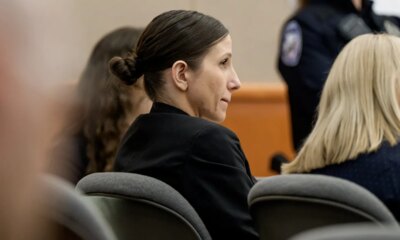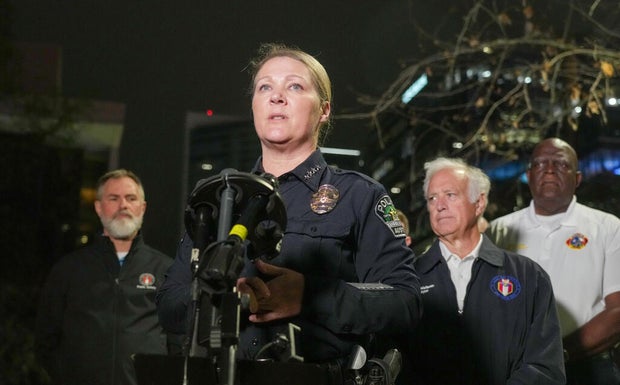News
Review by Senate Democrats finds more unreported luxury trips by Clarence Thomas

The Supreme Court is pictured on Oct. 7 in Washington, D.C.
Mariam Zuhaib/AP
hide caption
toggle caption
Mariam Zuhaib/AP
WASHINGTON — A nearly two-year investigation by Democratic senators of Supreme Court ethics details more luxury travel by Justice Clarence Thomas and urges Congress to establish a way to enforce a new code of conduct.
Any movement on the issue appears unlikely as Republicans prepare to take control of the Senate in January, underscoring the hurdles in imposing restrictions on a separate branch of government even as public confidence in the court has fallen to record lows.
The 93-page report released Saturday by the Democratic majority of the Senate Judiciary Committee found additional travel taken in 2021 by Thomas but not reported on his annual financial disclosure form: a private jet flight to New York’s Adirondacks in July and jet and yacht trip to New York City sponsored by billionaire Harlan Crow in October, one of more than two dozen times detailed in the report that Thomas took luxury travel and gifts from wealthy benefactors.
The court adopted its first code of ethics in 2023, but it leaves compliance to each of the nine justices.
“The highest court in the land can’t have the lowest ethical standards,” the committee chairman, Illinois Sen. Dick Durbin, said in a statement. He has long called for an enforceable code of ethics.
Republicans protested the subpoenas authorized for Crow and others as part of the investigation. No Republicans signed on to the final report, and no formal report from them was expected.
A spokesman for Crow said he voluntarily agreed to provide information for the investigation, which did not pinpoint any specific instances of undue influence. Crow said in a statement that Thomas and his wife Ginni had been unfairly maligned. “They are good and honorable people and no one should be treated this way,” he said.
Attorney Mark Paoletta, a longtime friend of Thomas who has been tapped for the incoming Trump administration, said the report was aimed at conservatives whose rulings Democrats disagreed with.
“This entire investigation was never about ‘ethics’ but about trying to undermine the Supreme Court,” Paoletta said in a statement posted on X.
The court did not immediately respond to a request for comment.
Thomas has said he was not required to disclose the trips that he and his wife took with Crow because the big donor is a close friend of the family and disclosure of that type of travel was not previously required. The new ethics code does explicitly require it, and Thomas has since gone back and reported some travel.
The report traces back to Justice Antonin Scalia, saying he “established the practice” of accepting undisclosed gifts and hundreds of trips over his decades on the bench. The late Justice Ruth Bader Ginsberg and retired Justice Stephen Breyer also took subsided trips but disclosed them on their annual forms, it said.
The investigation found that Thomas has accepted gifts and travel from wealthy benefactors worth more than $4.75 million by some estimates since his 1991 confirmation and failed to disclose much of it. “The number, value, and extravagance of the gifts accepted by Justice Thomas have no comparison in modern American history,” according to the report.
It also detailed a 2008 luxury trip to Alaska taken by Justice Samuel Alito. He has said he was exempted from disclosing the trip under previous ethical rules.
Alito also declined calls to withdraw from cases involving Donald Trump or the Jan. 6, 2021, attack on the Capitol after flags associated with the riot were seen flying at two of Alito’s homes. Alito has said the flags were raised by this wife.
Thomas has ignored calls to step aside from cases involving Trump, too. Ginni Thomas supported Trump’s efforts to overturn the 2020 presidential election that the Republican lost to Democrat Joe Biden.
The report also pointed to scrutiny of Justice Sonia Sotomayor, who, aided by her staff, has advanced sales of her books through college visits over the past decade. Justices have also heard cases involving their book publishers, or involving companies in which justices owned stock.
Biden has been the most prominent Democrat calling for a binding code of conduct. Justice Elena Kaganhas publicly backed adopting an enforcement mechanism, though some ethics experts have said it could be legally tricky.
Justice Neil Gorsuch recently cited the code when he recused himself from an environmental case. He had been facing calls to step aside because the outcome could stand to benefit a Colorado billionaire whom Gorsuch represented before becoming a judge.
The report also calls for changes in the Judicial Conference, the federal courts’ oversight body led by Chief Justice John Roberts, and further investigation by Congress.

News
Satellite images provide view inside Iran at war

Smoke rises over Konarak naval base in southern Iran on Sunday. The base was one of hundreds of targets of U.S. and Israeli forces throughout the country.
Planet Labs PBC
hide caption
toggle caption
Planet Labs PBC
Commercial satellite images are providing a unique look at the extent of damage being done to Iran’s military facilities across the country.
The U.S. and Israeli military campaign opened with a daytime attack that struck Iranian leadership in central Tehran. Smoke was still visible rising from Ayatollah Ali Khamenei’s compound following the attack that killed the supreme leader.

An image by the company Airbus taken on Saturday shows the aftermath of an Israeli strike on Iran’s Leadership House in central Tehran. Iran’s Supreme Leader Ayatollah Ali Khamenei was killed in the opening wave of attacks.
Pléiades Neo (c) Airbus DS 2026
hide caption
toggle caption
Pléiades Neo (c) Airbus DS 2026
Israel and the U.S. have gone on to strike targets across the country. Reports on social media indicate that there have been numerous military bases and compounds attacked all over Iran, and Iran has responded with attacks throughout the Middle East.
U.S. forces have also been striking at Iran’s navy. In a post on his social media platform, President Trump said that he had been briefed that U.S. forces had sunk nine Iranian naval vessels. U.S. Central Command did not immediately confirm that number but it did say it had struck an Iranian warship in port.

An image captured on Saturday shows a ship burning at Iran’s naval base at Konarak.
Satellite image ©2026 Vantor
hide caption
toggle caption
Satellite image ©2026 Vantor
Numerous satellite images show burning vessels at Konarak naval base in southern Iran. Images also show damage to a nearby airbase where hardened hangers were struck by precision munitions.

Hardened aircraft shelters at Konarak airbase were struck with precision munitions.
Satellite image ©2026 Vantor
hide caption
toggle caption
Satellite image ©2026 Vantor
And there was extensive damage at a drone base in the same area. Iran has launched numerous drones and missiles toward Israel and U.S. military installations in Bahrain, Kuwait and Qatar. Many drones have been intercepted but videos on social media show that some have evaded air defenses and caused damage in nearby Gulf countries. In Dubai, debris from an Iranian drone damaged the iconic Burj Al Arab, according to a statement from Dubai’s government.

Buildings at an Iranian drone base at Konarak were destroyed in the strikes.
Satellite image ©2026 Vantor
hide caption
toggle caption
Satellite image ©2026 Vantor
Iran’s most powerful weapons are its long-range missiles. The Iranian Revolutionary Guards have hidden the missiles deep inside mountain tunnels. Images taken Sunday in the mountains of northern Iran indicate that some of those tunnels were hit in a wave of strikes.
Following Khamenei’s death, Iran declared 40 days of mourning. Satellite images showed mourners gathering in Tehran’s Enghelab square on Sunday.
Iranian Foreign Ministry Spokesperson Esmail Baghaei told NPR on Sunday that Iran will continue to fight “foreign aggression, foreign domination.”
A White House official told NPR that Trump plans to talk to Iran’s interim leadership “eventually,” but that for now, U.S. operations continue in the region “unabated.”

A large crowd of mourners fill Enghelab Square in Tehran on Sunday, following the death of Iran’s Supreme Leader Ayatollah Ali Khamenei, who was killed in an Israeli airstrike.
Satellite image ©2026 Vantor
hide caption
toggle caption
Satellite image ©2026 Vantor
News
Video: What the Texas Primary Battle Means for the Midterms

new video loaded: What the Texas Primary Battle Means for the Midterms
By J. David Goodman, Alexandra Ostasiewicz, June Kim and Luke Piotrowski
March 1, 2026
News
Mass shooting at Austin, Texas bar leaves at least 3 dead, 14 wounded, authorities say

Gunfire rang out at a bar in Austin, Texas, early Sunday and at least three people were killed, the city’s police chief said.
Austin Police Chief Lisa Davis told reporters the shooter was killed by officers at the scene.
Fourteen others were hospitalized and three were in critical condition, Austin-Travis County EMS Chief Robert Luckritz said.
“We received a call at 1:39 a.m. and within 57 seconds, the first paramedics and officers were on scene actively treating the patients,” Luckritz said.
There was no initial word on the shooter’s identity or motive.
Davis noted how fortunate it was that there was a heavy police presence in Austin’s entertainment district at the time, enabling officers to respond quickly as bars were closing.
“Officers immediately transitioned … and were faced with the individual with a gun,” Davis said. “Three of our officers returned fire, killing the suspect.”
She called the shooting a “tragic, tragic” incident.
Austin Mayor Kirk Watson said his heart goes out to the victims, and he praised the swift response of first responders.
“They definitely saved lives,” he said.
Davis said federal law enforcement is aiding the investigation.
-

 World4 days ago
World4 days agoExclusive: DeepSeek withholds latest AI model from US chipmakers including Nvidia, sources say
-

 Massachusetts5 days ago
Massachusetts5 days agoMother and daughter injured in Taunton house explosion
-

 Denver, CO5 days ago
Denver, CO5 days ago10 acres charred, 5 injured in Thornton grass fire, evacuation orders lifted
-

 Louisiana1 week ago
Louisiana1 week agoWildfire near Gum Swamp Road in Livingston Parish now under control; more than 200 acres burned
-

 Technology1 week ago
Technology1 week agoYouTube TV billing scam emails are hitting inboxes
-

 Politics1 week ago
Politics1 week agoOpenAI didn’t contact police despite employees flagging mass shooter’s concerning chatbot interactions: REPORT
-

 Technology1 week ago
Technology1 week agoStellantis is in a crisis of its own making
-

 News1 week ago
News1 week agoWorld reacts as US top court limits Trump’s tariff powers




















